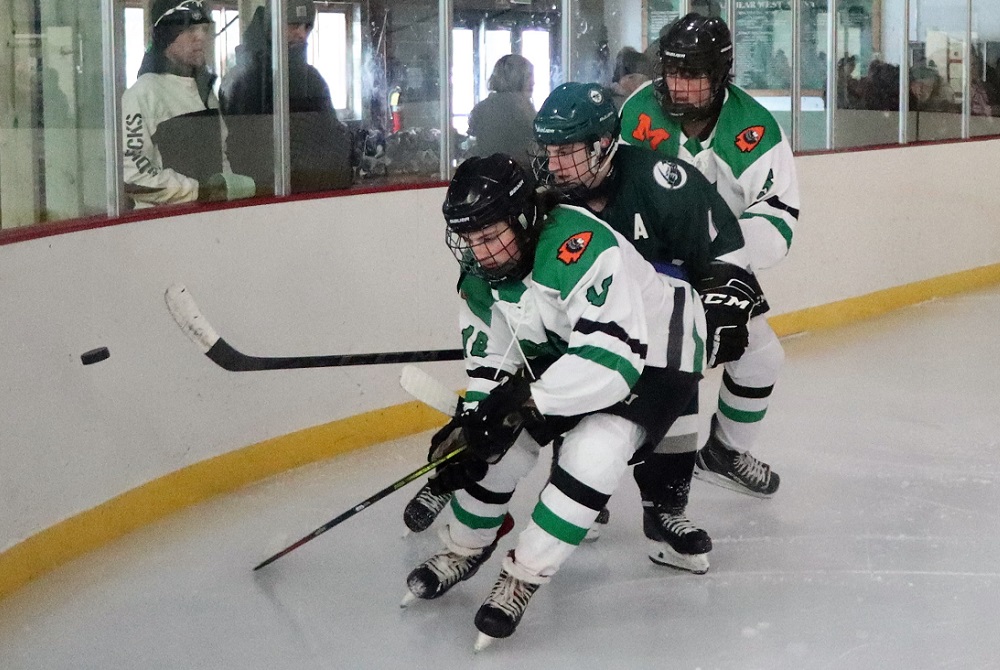
Manistique Hockey Co-Op Off to Successful Debut
By
John Vrancic
Special for MHSAA.com
February 4, 2022
MANISTIQUE — There’s a new kid on the block in Upper Peninsula high school hockey this season.
 The Manistique Emeralds, who launched a co-op program for the first time, already have made some noise while posting a 5-4-1 record through their first 10 games.
The Manistique Emeralds, who launched a co-op program for the first time, already have made some noise while posting a 5-4-1 record through their first 10 games.
Manistique is fresh from a 2-1 triumph over Painesdale Jeffers on home ice Saturday.
Also included in the co-op venture are Newberry, Munising and Eben Junction Superior Central.
“It feels great to have a high school program here,” said Manistique junior forward Carter Miller. “This is a big change from house league hockey. The high school game is a lot faster. This has been a pretty big transition. We had to get in shape faster and start a little earlier.”
The victory ended a two-game losing streak for the Emeralds, who dropped a 6-5 overtime decision to Escanaba on Friday and absorbed a 2-1 loss to Kingsford at Iron Mountain Jan. 25.
“It was a very exciting game last night,” coach John Nutkins said after Saturday’s game. “We trailed by three goals twice and took them into overtime. I think that gave us a lot of momentum for the rest of the season. We outplayed Kingsford, but had trouble putting the puck in the net. The guys are pulling together. We have to keep working and improving. We feel we’re in a stretch where we can win some games.”
The Emeralds travel to the Copper Country this weekend to face Negaunee on Friday and Jeffers on Saturday at Michigan Tech.
“They (Negaunee) don’t have a lot of guys, but they take quick shots,” said sophomore goaltender Alex Noble. “We just have to put pressure on the puck.
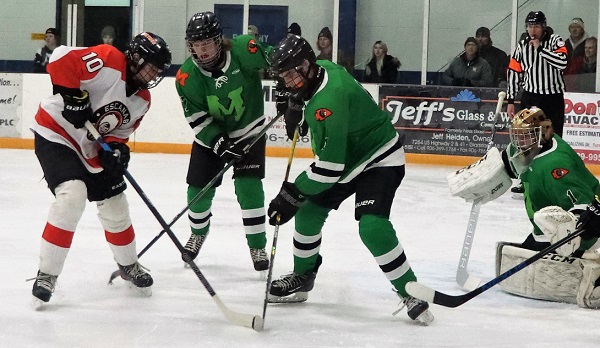 “(Defeating Jeffers) is a big W for us. I think this will give us momentum going into next weekend. We’ve been in a lot of close games. We didn’t give up against Esky. That was a real big game for us.”
“(Defeating Jeffers) is a big W for us. I think this will give us momentum going into next weekend. We’ve been in a lot of close games. We didn’t give up against Esky. That was a real big game for us.”
Dakota Maki, a senior forward from Superior Central, put the Emeralds on the board first in a 6-1 road loss to Escanaba.
“That’s definitely not a game we want to remember,” said Nutkins. “Although, it was exciting to get the early goal. They have a great hockey program, but I don’t think that’s who we are. It’s always kind of a feeling out process. In the first game at Iron Mountain they (Kingsford) were flying. It was kind of a culture shock. I feel we’ve improved a lot from the beginning of the season.”
Manistique dropped a 1-0 decision to the Flivvers on Nov. 18, then tied with Jeffers 1-1 and beat the Hancock jayvees 2-0 at MTU at the start of December.
The Emeralds followed that with a 7-3 triumph over Kingsford in their home debut Dec. 16.
“That was definitely exciting,” said Gavin Nutkins, a sophomore forward from Newberry. “There were more than 300 people here. I’ve never experienced that before. The fans have supported us very well. I think we’ve done very well. We are just getting into game shape, and it’s starting to show.”
Noble stopped 26 shots in Saturday’s victory over Jeffers.
“This is a big step up,” he said. “We just have to work hard for it. This is a bit stronger competition and a faster game.”
Gavin Nutkins said he got interested in hockey at a very young age.
“I played baseball and football, but nothing compares with hockey,” he added. “It’s really hard with school. My dad’s the coach, which makes it a little easier. It’s about an hour’s drive both ways. We usually get home about 9:30 or 10 p.m., then I have to study for 2-3 hours, get about six hours of sleep and go to school. Sometimes you get a little tired.”
 John Vrancic has covered high school sports in the Upper Peninsula since joining the Escanaba Daily Press staff in 1985. He is known most prominently across the peninsula for his extensive coverage of cross country and track & field that frequently appears in newspapers from the Wisconsin border to Lake Huron. He received the James Trethewey Award for Distinguished Service in 2015 from the Upper Peninsula Sportswriters and Sportscasters Association.
John Vrancic has covered high school sports in the Upper Peninsula since joining the Escanaba Daily Press staff in 1985. He is known most prominently across the peninsula for his extensive coverage of cross country and track & field that frequently appears in newspapers from the Wisconsin border to Lake Huron. He received the James Trethewey Award for Distinguished Service in 2015 from the Upper Peninsula Sportswriters and Sportscasters Association.
PHOTOS (Top) Manistique attempts to maintain possession against Painesdale Jeffers. (Middle) The Emeralds defend in front of their goal against Escanaba last month. (Photos by Veronica Edwards.)
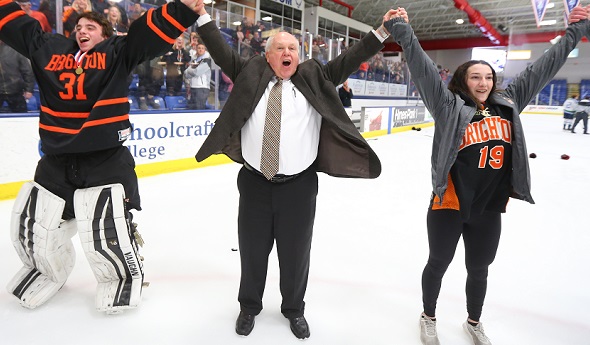
Brighton Coach's Impact 'Immeasurable'
By
Tim Robinson
Special for MHSAA.com
October 7, 2020
By Tim Robinson
Special for Second Half
Paul Moggach has never been much for looking back.
 And as he begins his first season away from the Brighton hockey program in more than three decades, he’s still looking ahead.
And as he begins his first season away from the Brighton hockey program in more than three decades, he’s still looking ahead.
“I’m thinking about what I’m going to miss more than the mark I left,” he said in a phone conversation last week. “I guess I enjoyed so much of the time I had, the opportunity to coach at Brighton, I’m thinking more how I fill the time and the things I'll miss.”
Moggach (pronounced MUG-uth) retired as Brighton’s coach this past summer after 25 seasons and having led five teams to MHSAA Division 1 championships. He compiled a record of 466-172-47 during that period.
But that’s not what he remembers most, nor why he wants people to remember him.
“I would like them to remember the teams and players who played for me and my assistants, more than me,” Moggach said. “We have so many blessings and opportunities in our lives, and hockey was one for me and hopefully for the players and assistants I worked with.”
One of those assistants was Kurt Kivisto, who joined the Bulldogs originally as a team manager more than 20 years ago and was a player at Brighton. He eventually won a national championship at Michigan State before rejoining the program as an assistant coach a decade ago.
“The No. 1 thing I’ll take from him is sticking by your beliefs and not sacrificing those beliefs for the team,” said Kivisto, who was named Moggach’s successor in September. “He sticks by those beliefs and ... he’s not willing to sacrifice that even if it could hurt the team. The character and integrity he has, how he treats people with fairness and what he believes is right is the biggest thing I’ll take.”
A stepson, Damon Whitten, played for Moggach at Brighton and at MSU before becoming an assistant coach and eventually the head coach at Lake Superior State, where he is in his eighth season.
Asked about Moggach’s impact at Brighton, Whitten said, “I’m not sure you can measure it. Your mind goes to the hockey players who have come to Brighton, and that’s a big part. But I think it goes beyond that. The money they’ve raised over the years for different families in need, for example. He’s had a big impact, and the players he had were a big part of that, but it goes well beyond that, and he did it the right way. Thirty-plus years (in the program), and I’m not sure you can count more than a handful of times where he made a bad decision or handled things poorly. He did things the right way, every day, all of the time, and I think it’s why he was so successful for so long.”
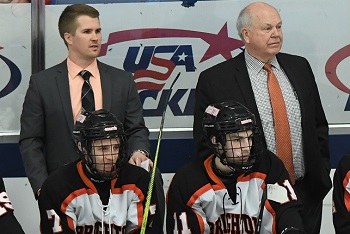 The team’s charitable works were mostly kept under the radar – Moggach’s reasoning being his players had been given much, it was their turn to give back, and he didn’t want people thinking they did those things for publicity.
The team’s charitable works were mostly kept under the radar – Moggach’s reasoning being his players had been given much, it was their turn to give back, and he didn’t want people thinking they did those things for publicity.
Moggach joined Rick Bourbonais as an assistant at Brighton in the mid-1980s, then switched roles with him for the 1996-97 season.
He realized Brighton’s potential in the 1992-93 season, when the Bulldogs upset perennial state power Trenton in the Class A Quarterfinals before losing to Detroit Catholic Central in a Semifinal.
“That, to me, said, at least in my mind, that we can do this,” Moggach said. “It’s not impossible.”
He slowly began to build the program, getting good players and a schedule that would challenge them.
“You get the players by building a good culture,” he said. “Back in the day, when I started, we weren’t very disciplined and our league wasn’t very disciplined. So I think we realized we had to build that, and I could have an influence on building that in Brighton.”
Along with the culture, Moggach looked for an edge whenever he could find it. He was talked into making a trip to the Keweenaw Peninsula by one of his player’s parents, and found enormous benefits for his team, both competitively and in team bonding.
“It’s a lot about the little things we do,” he said, “that we find joy in, and create those opportunities. Creating the little moments really can build to bigger moments. We played capture the flag one day in about two feet of snow.
“Almost killed them,” he added, chuckling. The exhausted players didn’t have much left for the game that night, but spending time together for four days in a bus and hotel room always brought the team closer on and off the ice.
That first UP expedition also led to more teams making the trip, for team bonding and a glimpse of a part of the state, and themselves, they might never have seen otherwise.
“We didn’t do that for long,” he said. “But we always came back saying we were better together because of that experience.”
Bob Nelson had three sons play for Moggach, and Nelson’s wife, Kris, was president of the team’s booster club during their involvement over nearly a decade in Brighton hockey. Nelson also coached the program’s younger players for five seasons.
“We got to know the Moggachs really well,” he said. “It was a good experience, both as a coach and as a parent as well.”
Moggach introduced other things, including an emphasis on nutrition and off-ice training, that players resisted at first until they saw the benefits.
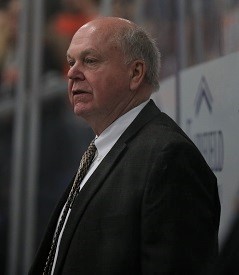 He savored conversations with referees and opposing coaches before the games and even the occasional reporter after games.
He savored conversations with referees and opposing coaches before the games and even the occasional reporter after games.
But his first priority was the players. At times he would erupt in practice at a player or, more commonly, the team, and the boys soon learned to hear the message, not the volume. But for a couple of seasons, they also wrote some of his wilder statements down in a notebook after practice.
One year, they read some of them at the banquet, and after each one, Moggach’s wife, Sharon, would look at him and ask, “Did you really say that?”
Moggach would laugh and confess to remembering he had actually done so, then laughing.
“He knew part of what made the program good was his relationship to the players,” Nelson said. “If it was a good time, he wanted to enjoy it, even at his own expense at times.”
Moggach has staying in the background this offseason, letting Kivisto shape the team.
Asked if he were willing to fully switch coaching roles, as he and Bourbonais did a quarter-century ago, Moggach laughed.
“No,” he said emphatically. “Rick wasn’t in his 70s when we made the switch. Kurt needs his time. I’ll be there if he needs me.”
Moggach, who is 74, still works fulltime as the University of Michigan’s director of risk management.
He plans to spend more time with his wife and watch his grandsons play hockey, as well as catching some Lake Superior State games.
“I was really blessed to have Rick and Brownie (longtime assistant Mike Brown) along for the ride, and then to get Kurt involved,” Moggach said. “They weren’t the only ones, but they were the kids for me.
“The other thing is the support from the Brighton (High School) administration, the teachers, and our community. There are more people to thank than I could ever bring up. I do think that, all together, it was a great run. It couldn’t have been any better.”
PHOTOS: (Top) Recently-retired Brighton hockey coach Paul Moggach celebrates the 2018 Division 1 championship game win over Saginaw Heritage at USA Hockey Arena. (Middle) Former player Kurt Kivisto, left of Moggach during the 2018 Semifinal win over Detroit Catholic Central, served as an assistant before assuming the head coaching job in September. (Below) Brighton's 2018 championship was its fifth under Moggach. (Photos by Hockey Weekly Action Photos.)

